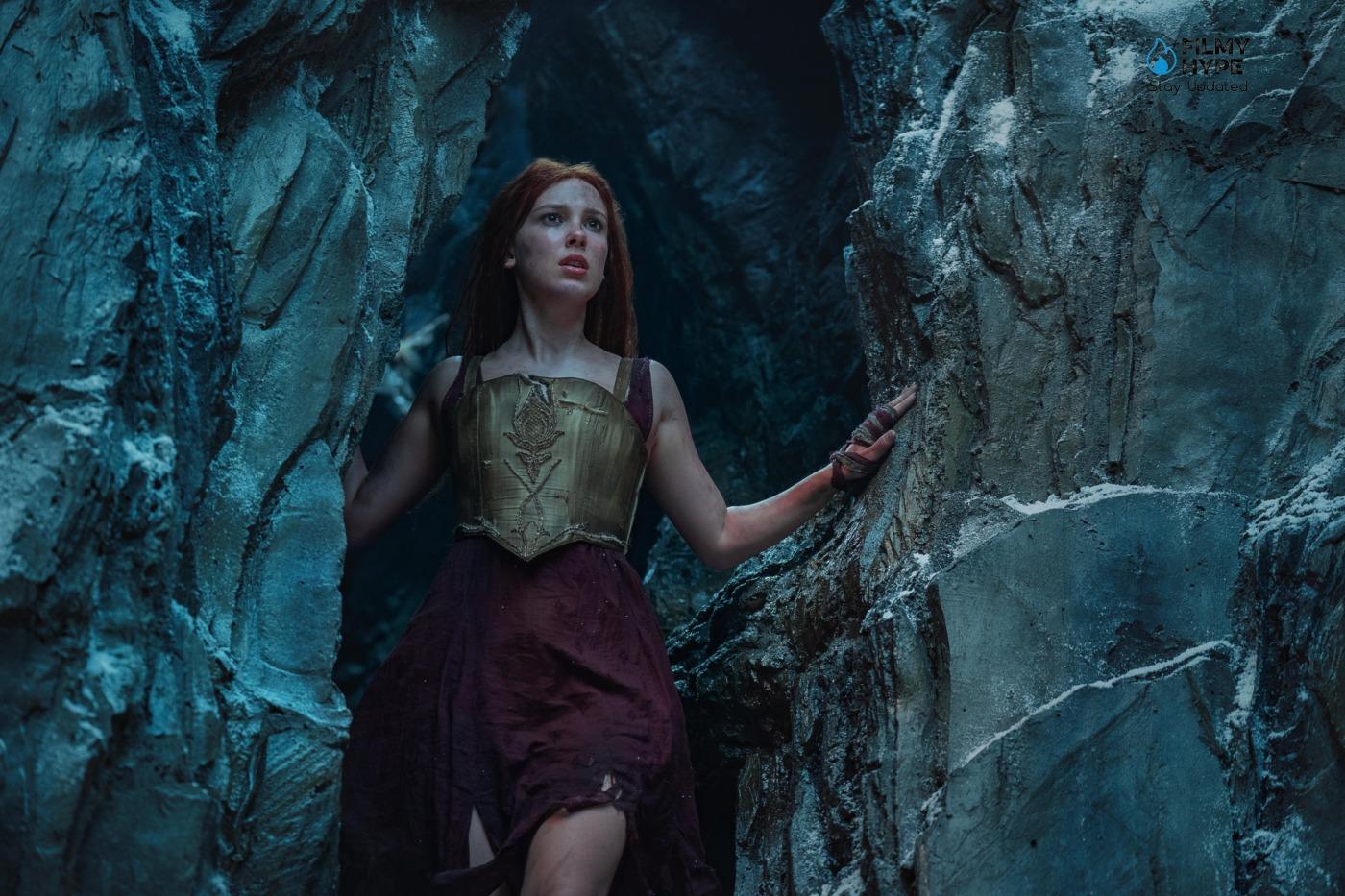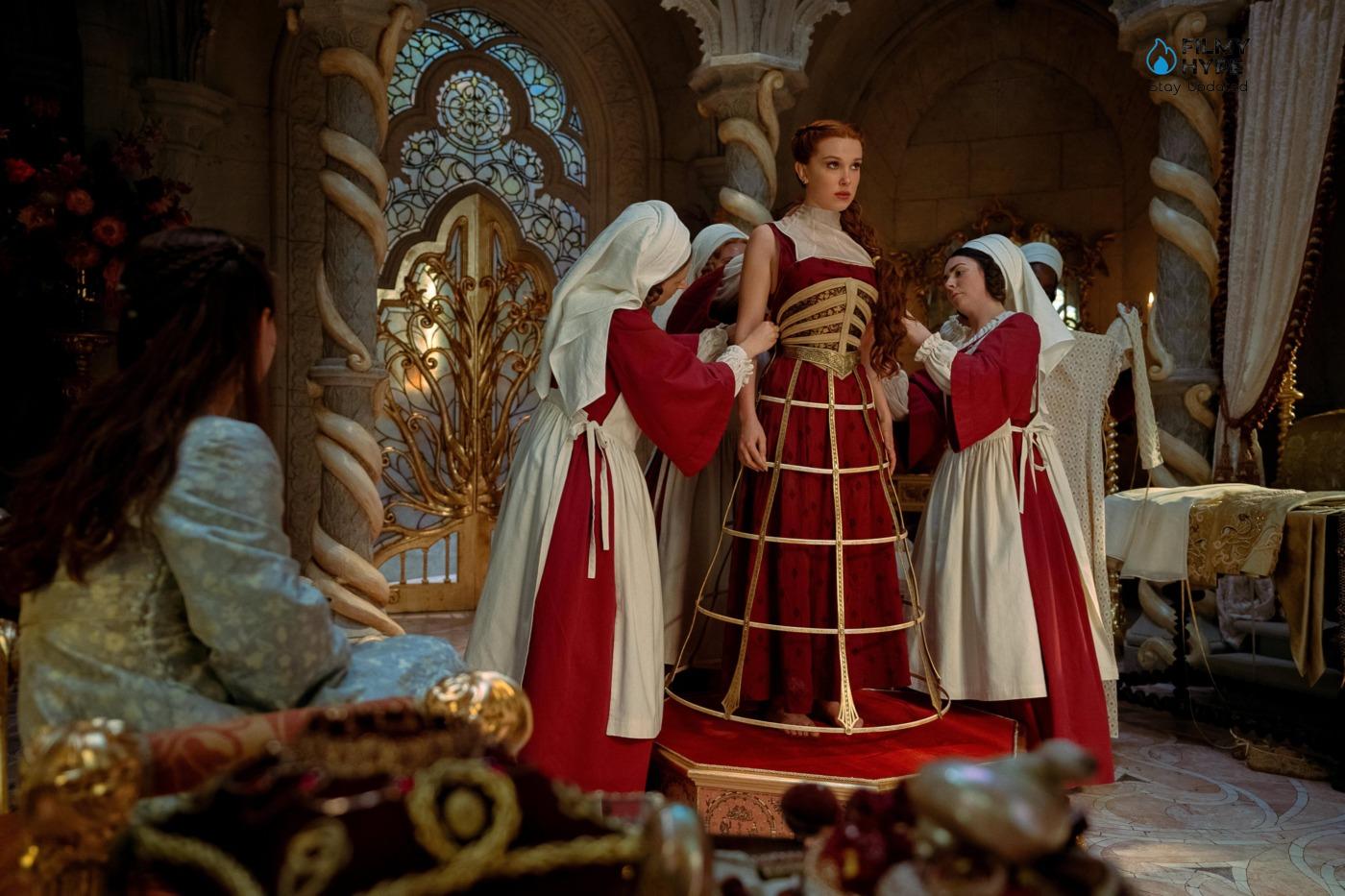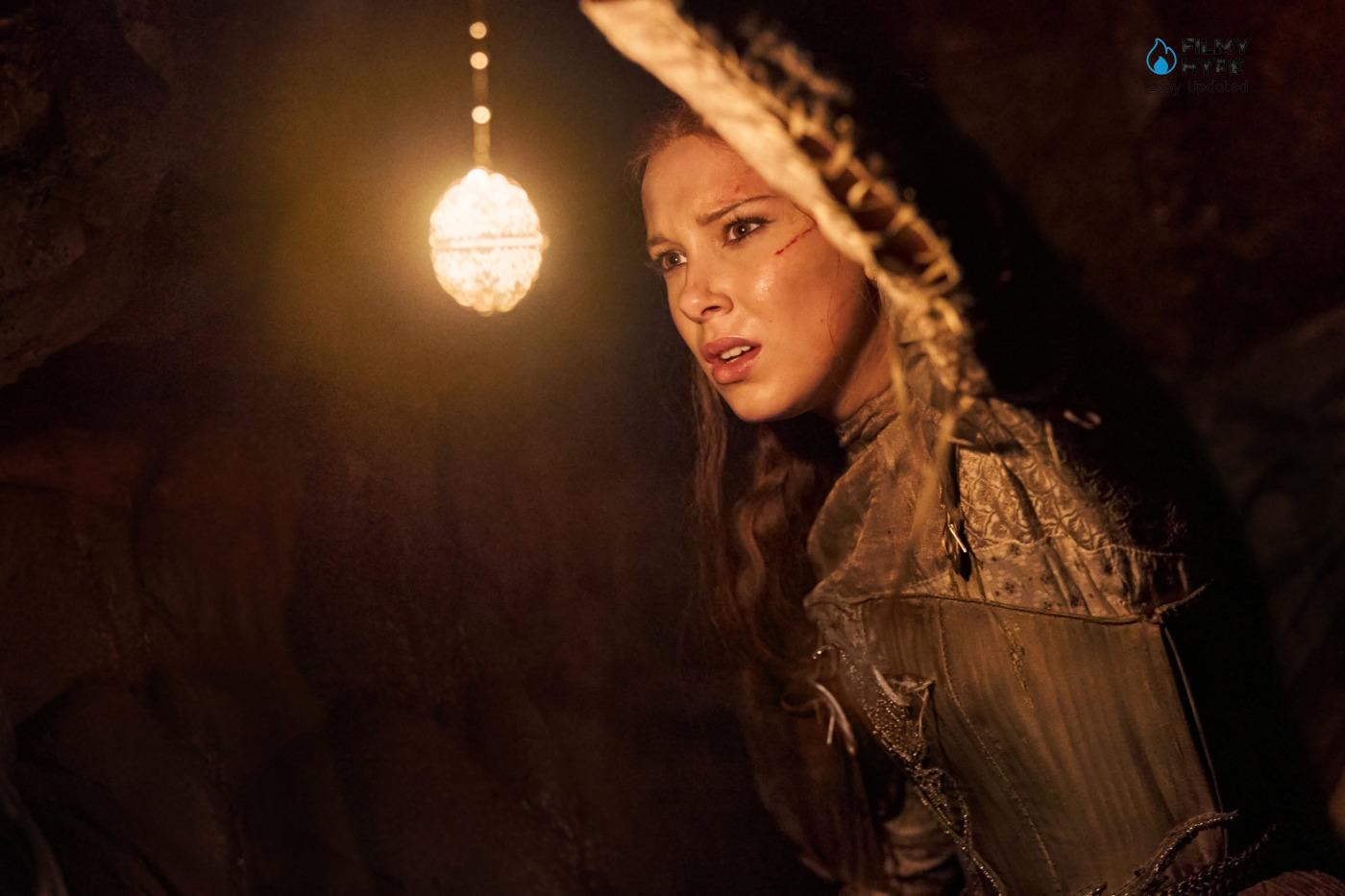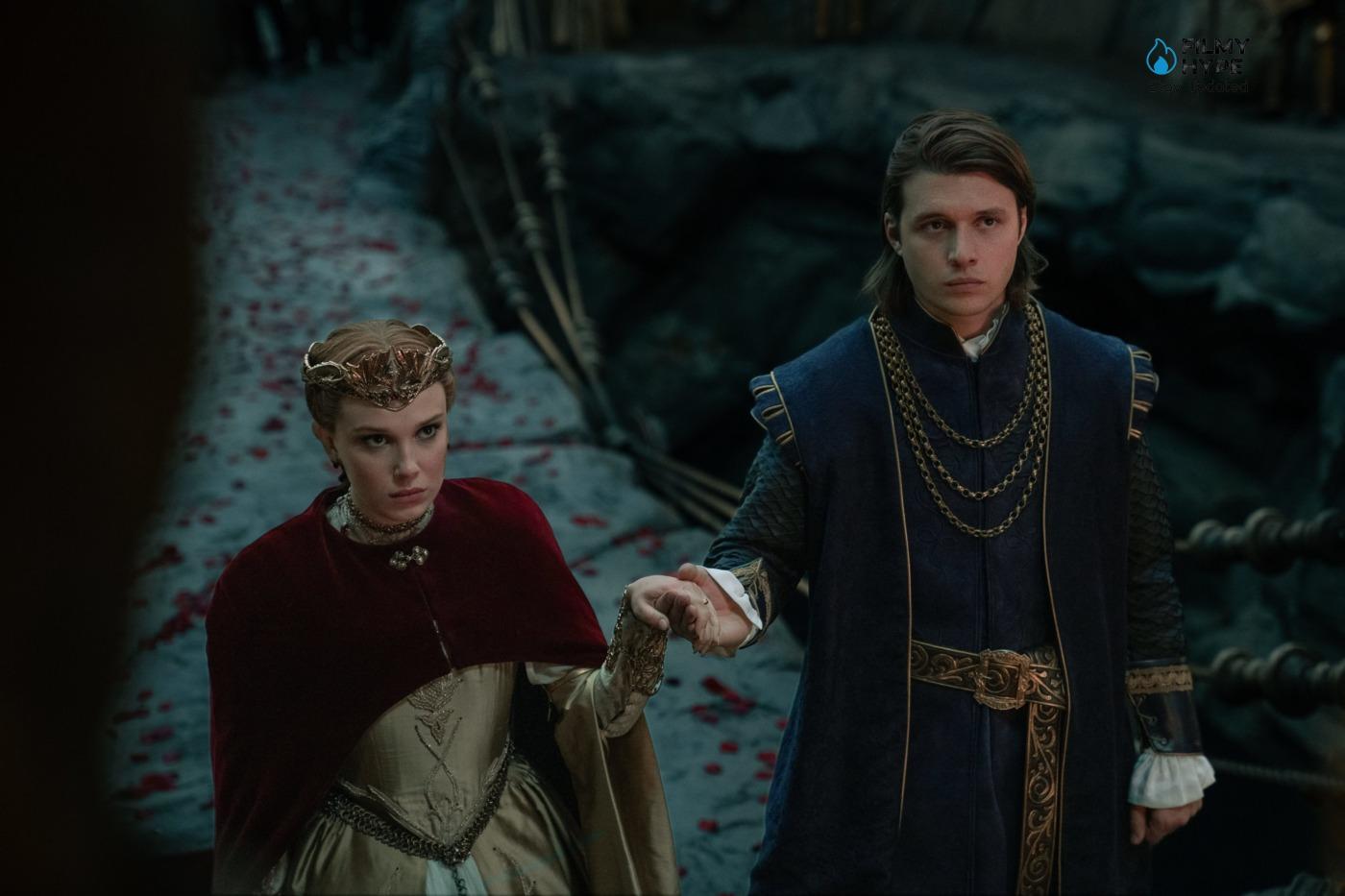Damsel Review: A Feminist Netflix Fairy Tale Against Systematic Violence
Cast: Millie Bobby Brown, Angela Bassett, Robin Wright, Ray Winstone, Nick Robinson
Directed By: Juan Carlos Fresnadillo
Streaming Platform: Netflix
Filmyhype.com Ratings: 3/5 (three stars)
“This is not a fairy tale” This is the tagline of Damsel, a film distributed in streaming on Netflix which sees, after more than ten years, the return to film direction of Juan Carlos Fresnadillo. It’s not a fairy tale, even if kingdoms, kings, queens, and princesses are involved. And also a dragon. Indeed, as we will later discover, a dragon. At least it is not a fairy tale in the conventional sense of the term, that is, the one shaped in the collective imagination by the arrival of a Prince Charming on the back of a white horse. The knights on horseback in Damsel end up very badly. In the first scene of the opera, they are torn to pieces by that very dragon, a powerful and threatening creature who has threatened and held the lush kingdom of Aurea in check for generations. She periodically asks the royals of these lands for a tribute of blue blood to quench her hunger and thirst. What if a princess took the role of the knight? What if a woman saved herself by becoming the heroine of a story of princes and princesses, of enchanted worlds with fire-breathing dragons and evil queens?

If in recent decades fairy tales have always (or almost always) had their well-defined roles, an immutable narrative structure, and a happy ending in which the prince saves the princess and they live happily ever after, in the new Netflix film Damsel starring Millie Bobby Brown, all these changes and the canonical roles of fairy tale characters are overturned, sending the public a beautiful message of female empowerment which, not surprisingly, arrives in conjunction with Women’s Day. Damsel‘s world, however, is not only dangerous but also petty. Elodie (Millie Bobby Brown), betrothed to Aurea’s scion (Nick Robinson), ends up in this macabre carousel unaware and at her own expense. The marriage will be fundamental to filling the empty food reserves of the lands of her father (Ray Winstone), rewarded handsomely by Queen Isabelle (Robin Wright). But although Elodie’s stepmother (Angela Bassett) senses that something doesn’t add up to this agreement, the girl already welcomes her wedding clothes. Until, well, the ritual is completed, and she is thrown into the caves to be fed to the beast.
Damsel Review and Analysis
Elodie is the eldest daughter of the Lord of a remote land, very poor and devastated by increasingly harsh winters. The situation seems desperate but salvation comes in a completely unexpected way: a marriage proposal from the rulers of Aurea for Prince Henry, heir to a rich kingdom that they have never heard of. Elodie immediately accepts because she understands what it could mean for her people and she sets off with the whole family: her father, her stepmother, and her little sister Floria. Having arrived at their destination, Elodie and her family are welcomed with great pomp, amidst pomp and incredible riches. Even the betrothed isn’t even that bad, on the contrary, Henry seems genuinely interested in the young woman, who immediately begins to reciprocate.

It’s a shame that something sinister is hidden among the smiles and coaxing of the future in-laws, but – with Elodie too convinced of Henry’s good faith – the only one who realizes it seems to be their stepmother (Angela Basset). Things take a tragically unexpected turn when on the day of the wedding, during a ceremony in honor of the ancestors of the royal family of Aurea, Henry throws Elodie into a well inside a mountain, sacrificing her in the name of a creature who he made those rocks his lair. Having survived the fall, Elodie will soon realize that she must use all her skills and ingenuity to survive the beast that wanders in the dark, and that only wants to incinerate her: an ancient dragon to which the brides of the princes of Aurea are sacrificed, after centuries before a king had dared to challenge him. Saving yourself seems impossible, among rivers of fire, dark caves, and very dangerous overhangs, but Elodie hides many more resources within herself than one could ever imagine…
Damsel Review and Analysis
The real attraction inspired by Damsel lies precisely in the reversal of a stereotypical fairy-tale situation and in the criticisms beyond the small screen in this sense. All the fascination derives precisely from the story of emancipation which acts as the guiding voice of the entire narrative, breaking with the models that we have all always known in this sense. The evolution of the protagonist is the prominent element of the entire feature film, as well as the most interesting aspect to see in perfect contrast to the stories in which courage and adventurous ability remain the exclusive prerogative of men. Elodie is the classic fairytale princess, in her beauty also lies the initial naivety of a submission rooted in the context in which she was born and is growing up when we know her. This specific identification, however, will soon clash with an injustice that has long been visited upon the girls who choose to “obey” in this sense, fueling something dark and much bigger than themselves.
Obedience, submission, reaction, and discovery of oneself and one’s strength beyond everything else. Here Damsel undertakes to build a world that is first of all extremely familiar and colourful, and then contrasts its “golden patina” with real femicide that has deep roots. The systematic nature of subcutaneous violence as a function of a context that looks the other way, denying its very existence. From this point of view, Damsel strikes and touches interesting chords. The protagonist’s story itself is never mirrored, once the dots are joined, towards a physical or unique antagonist, multifurcating the vision of an evil that has taken over in a much broader and more complex way than one might imagine. The dragon, as well as the dark cave and everything that Elodie finds inside, are passage steps connected with the reasoning that is difficult to label or simply identify in someone. Working in such a context, therefore, Damsel stages an all-female story of revenge and emancipation beyond the terror of darkness.

The protagonist’s strength to react immediately becomes a positive model to be reiterated, despite her extreme characteristics, working on a self-awareness capable of finding her way even when everything seems to go against her. If from a conceptual point of view, Damsel leaves its mark, it is in the general rendering and characterization of the story that it is not too impactful. The film directed by Juan Carlos Fresnadillo carries forward its reasoning by always working in a context that makes simplism a constant. Indeed, such an approach is perfectly linked to the same descriptive dynamics that could also be found in a fairy tale but… what is missing, in this case, is precisely that originality capable of surprising and leaving you speechless.
Damsel is by no means the first figurative work to attempt to subvert fairytale rules and stereotypes (look at the whole Shrek saga which turned this idea into something brilliant and iconic) but… in its development, it is impossible not to predict what will happen next, or at least be genuinely surprised from the start. The idea behind the film is, therefore, clearer than ever, immediately establishing itself as the main interpretation of an experience that is striking, but without ever managing to amaze. The conceptual gaze, as well as Millie Bobby Brown’s interpretation, remain the pre-eminent values of a work that is both fresh and quickly usable. As we anticipated at the beginning, Damsel‘s story is undoubtedly an engaging one, especially in its first part, when Elodie’s arrival in Aurea is described, and in the central part, in which the young protagonist must fend for herself against the dragon, among a thousand pitfalls.
In the final portion, the narrative becomes a little too hasty and predictable, stumbling upon a series of naiveties and errors – sometimes, for example, the protagonist gets away with showing skills that we are never told how she acquired – and in a CGI that is far too crude (when we finally see the dragon in all its magnificence the impact is a bit disappointing). Having said that, however, Damsel is a somewhat innovative and somewhat old-fashioned fairy tale, which takes a series of good ideas and – although not always developing them to the best – uses them to capture the young target audience. The idea of a princess who saves herself is certainly not very original, but the hellish descent to which Elodie is subjected has little that is traditional, between nightmare scenarios and a villain who is at times truly terrifying. The ending, however, brings everything back to what has already been seen, and as in every self-respecting cinematic fairy tale, the heroine has her happy ending after discovering that even the cruelest of monsters hides a wounded heart.

A point definitely in Damsel‘s favor, however, is how the beauty of the situation is dismissed, without any possibility of redemption for her crimes. Milly Bobby Brown is fabulous in a character that is a bit Lara Croft and a bit Sansa and Arya Stark (she even comes from the Northern kingdoms!) and, despite a series of overly emphatic sequences and dialogues, she works very well in the role of the heroine Elodie. She also impresses the prestigious supporting cast – the “good” stepmother is the extraordinary Angela Basset while the evil queen is played by Robin Wright – which is a bit wasted given the obligatory stage omnipresence of the protagonist. Damsel is, as we were saying, a successful mix in part of what – according to the big production companies – can appeal to Generation Z, and which also winks at the past, tracing the topoi of old-style cinematographic fairy tales: a little Fantaghirò a part Rebel – The Brave and Frozen, part nineties fantasy film (and we have to mention the unforgettable Dragonheart again) part young adult story for today’s young women, who don’t need a prince but save themselves alone (and joyfully set fire to all their enemies).
There are narrative ingenuities – above all, we repeat, in the ending – but Juan Carlos Fresnadillo’s film entertains and amuses and will certainly be successful on Netflix with its target audience. In short, the structure is one step away from working, despite some rather gross staging oversights (the position of objects and Elodie’s wounds) and a probably excessive duration. Damsel, however, doesn’t find the nerve and doesn’t capture that spark that could give Fresnadillo’s work even the slightest merit of being raw but with a central icon. In other times, far from those of streaming, it could have been a sculpture. Damsel is an anti-fairy tale. She wants to deconstruct the myth of the princess with a protagonist who takes off her crown and takes up the sword to fight for her life. The survival movie feel is intriguing, but Millie Bobbie Brown never really emerges with the right grit of an action heroine.
Damsel Review: The Last Words
Damsel is one of those films that addresses itself directly to the public right from the sponsorship phase, attracting people through its conceptual construction and the involvement of a recognizable star. As a whole, the feature film, on Netflix from 8 March 2024, entertains and intrigues, offering a fairy tale with a fresh and current taste, and subverting the same clichés in which its underlying imagery is generated. In general simplicity, we interface with a product that knows how to entertain while dealing with very serious dynamics and of considerable weight. Everything rests on Millie Bobby Brown’s interpretation, in an experience that convinces in this sense, despite its general simplicity. Damsel is a mix of modern and nostalgic which works in an intriguing first part in the right way, but which however loses its bite towards the ending, which is a bit predictable. Juan Carlos Fresnadillo’s film entertains and amuses, and will certainly be successful with its target audience.






